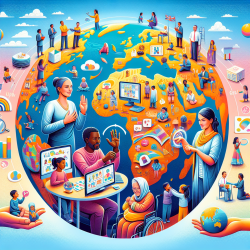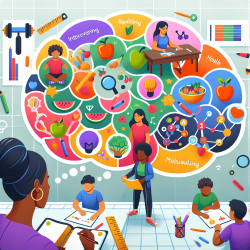The field of speech-language therapy is at a pivotal moment. As practitioners, we are tasked with not only addressing individual needs but also considering the broader global context in which we operate. The research article "Stitching a new garment: Considering the future of the speech–language therapy profession globally" provides valuable insights into how we can reshape our practice to be more inclusive and effective worldwide.
Understanding Global Challenges
The article highlights several key challenges faced by the speech-language therapy profession globally. These include disparities in access to services between Majority and Minority World countries, the need for culturally relevant practices, and the importance of equitable service delivery. As practitioners, it's crucial to recognize that while we may be well-equipped to address communication disabilities in our local contexts, there is a pressing need to adapt our methods to meet diverse global needs.
Centering People Experiencing Communication Disabilities
A central theme from the research is the necessity to focus on individuals experiencing communication disabilities (CD) as the main beneficiaries of our services. This involves shifting away from a deficit model that emphasizes impairments and towards recognizing communication as a fundamental human right. By doing so, we can better tailor our interventions to support not just speech and language development but overall participation in society.
Embracing Participation and Community Engagement
The research advocates for a participatory approach that involves engaging with communities to develop contextually relevant services. This means collaborating with local stakeholders and utilizing frameworks like community-based rehabilitation (CBR) to enhance life participation for individuals with CD. Such collaboration ensures that services are not only accessible but also culturally sustaining.
Promoting Equity in Service Delivery
Equity is another critical theme identified in the article. To achieve equitable service delivery, we must consider social determinants of health such as race and gender. This involves creating systems that provide fair access to communication-related support globally. Practitioners are encouraged to advocate for systemic changes that reduce barriers and promote inclusion.
Innovative Approaches for Future Practice
The article proposes several innovative approaches that practitioners can adopt:
- Terminology Revision: Rethink professional language to reflect human rights and social models of disability.
- De-Imperialized Frameworks: Develop global practices through reciprocal engagement with diverse perspectives.
- Co-Designing Services: Partner with communities to create services that strengthen capacity and support communication.
These strategies not only enhance our practice but also ensure that we are meeting the needs of all individuals experiencing CD, regardless of their geographical location.
A Call to Action
The time is ripe for transformation within the speech-language therapy profession. We must embrace innovation and collaboration to create a future where communication support is accessible and equitable for all. By engaging with diverse voices and adopting new models of practice, we can ensure that communication becomes a recognized human right worldwide.
For practitioners looking to deepen their understanding and contribute to this global conversation, further research and active participation are essential. We encourage you to explore these themes and consider how they can be integrated into your practice.
To read the original research paper, please follow this link: Stitching a new garment: Considering the future of the speech–language therapy profession globally.










